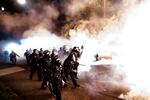At the end of August, in a green leafy park in Northeast Portland, Renn Cannon laid out a new effort surrounding incidents at racial justice protests.
“The FBI is going to take a larger role in investigating these nightly acts of violence,” the special agent in charge of the FBI’s Portland field office said.
At the time, Cannon said he was concerned about the toll protests were having on the city.
“What I’m letting people know is we’re expanding that investigative footprint,” he said. “After 90 days, the cumulative effects are becoming more and more severe. And that’s the role of the federal government: to help with problems where the public’s safety is in danger.”
The U.S. Department of Justice has expanded its resources in the city of Portland. The agency’s goal was to bring criminal cases against people who it believes have broken the law amid nightly racial justice protests that have now entered their fifth month. But in some cases, the federal government is acting more like a local prosecutor, and some say that is going too far.

Police use chemical irritants and crowd control munitions to disperse protesters during a demonstration in Portland, Ore., Saturday, Sept. 5, 2020. Hundreds of people gathered for rallies and marches against police violence and racial injustice Saturday night in Portland, Oregon, as often violent nightly demonstrations that have happened for 100 days since George Floyd was killed showed no signs of ceasing.
Noah Berger / AP
So far, the U.S. attorney’s office in Oregon has brought more than 90 federal charges, mostly misdemeanors either involving federal officers or federal property.
But this month, for the first time, the office brought new charges against protesters — ones that didn’t have a clear federal connection.
“We’re doing it because we believe in having an impact at ending this violence; that’s why we’re doing it,” Oregon’s U.S. Attorney Billy Williams said. “We’re looking at every tool available.”
Those new cases revolve around civil disorder charges, and they signal a shift at the Department of Justice to a more aggressive approach against protesters.

U.S. Attorney for Oregon Billy J. Williams speaks at a press conference in Portland, Ore., Wednesday, Oct. 2, 2019.
Conrad Wilson / OPB
In one case, the FBI said a protester allegedly used a slingshot to strike a Portland firefighter with a ball bearing. In a separate case, the FBI alleges a protester threw a helmet at a Portland police officer, hitting the officer, who was also wearing a helmet.
Those incidents, and others like them, didn’t take place on federal property and didn’t involve threats to federal law enforcement. But federal prosecutors argue they’re able to charge the cases because the so-called civil disorder prevents interstate commerce, in this case blocking roads.
Williams said FBI agents have combed through hundreds of arrests by local police, looking for possible federal charges.
“And we continue to look through,” he told OPB.
So far, federal prosecutors have focused civil disorder charges against those protesting police. It’s a little-used charge passed by Congress in 1968. At the time, some pro-segregationist U.S. senators wanted the federal government to be able to crack down on the civil rights movement.
“It’s tragically ironic that the federal government is using this civil disorder statute,” said Lisa Hay, the federal public defender for the District of Oregon. “I mean when you look back to the Congressional record, it has such racist overtones when it was passed. ... It’s terrible to be using this statute for this kind of protest.”
Hay represents protesters, including those charged more recently with civil disorder. She argues these charges go too far and show the federal government ignoring state sovereignty.
“The U.S. attorney is appointed by the president,” Hay said. “He’s not accountable to the people of Oregon in any way. So that’s where there’s a concern, when the federal government steps in and starts prosecuting cases that could be prosecuted in the county. And I don’t want to guess on the motivations, but obviously, the U.S. attorney reports to Washington D.C. And this U.S. attorney’s office is definitely aggressively prosecuting what they perceive to be federal crimes.”
In May, newly elected Multnomah County District Attorney Mike Schmidt was elected with nearly 77% of the vote.

District Attorney Mike Schmidt at a press conference Aug. 30, 2020, in Portland, Ore. A man was shot and killed the previous night as a Trump car caravan rolled through downtown.
Bradley W. Parks / OPB
Just after taking office in August, Schmidt declined to prosecute nonviolent crimes at protests because he said it could be seen as stifling First Amendment rights. The result: hundreds of protest related arrests were dismissed.
Schmidt declined interview requests to talk about federal prosecutions, but he did speak about his policy this month on OPB’s “Think Out Loud.” (Listen to the interview by clicking the play button below.)
“I was sending a signal and saying this is where I’m going to put our resources: to people that are causing harm and violence,” Schmidt said. “We can actually do damage to the legitimacy of the criminal justice system if we are seen being heavy headed, potentially chilling legitimate speech that is critical of this very system.”
Schmidt’s policy has angered many in law enforcement.
During the last several months, the U.S. Marshals Service deputized more than 100 local law enforcement officers, including Oregon State Police troopers, Multnomah County Sheriff deputies and Portland Police officers. For the rest of the year that gives local police the option of sending cases directly to federal prosecutors rather than going through Schmidt’s office.
Late Tuesday, Portland Mayor Ted Wheeler, who is also the city’s police commissioner, asked Williams to de-deputize Portland police. Williams rejected that request, saying the deputations are needed to end “dangerous conditions prevalent in downtown Portland due to a lack of leadership.”
